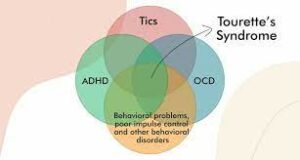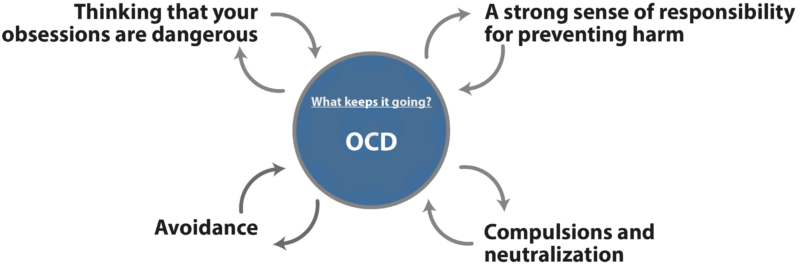If you are one of the millions of people who suffer from OCD, you know that the tics can be debilitating. Sometimes, it feels like there is nothing you can do to make them go away. Well, we have some good news for you! There are a number of treatment options available that can help lessen the impact of OCD tics. In this blog post, we will discuss some of the best options available to you.
Contents
What are The Best OCD TICS Treatment Options?

The Best OCD TICS Treatment options are as follows:
1. Cognitive Behavioral Therapy (CBT)
This therapy is focused on helping individuals modify their thoughts and behaviors to better cope with the symptoms of OCD TICS. It teaches skills such as relaxation techniques, challenging negative or intrusive thoughts, and problem-solving. CBT has been found to be effective in helping people manage their OCD tics and reduce the severity of symptoms.
2. Exposure and Response Prevention (ERP)
ERP involves gradually exposing patients to their fears or triggers while helping them learn how to cope with the anxiety they experience in response. It teaches people to resist performing compulsive behaviors, as well as identify and challenge negative thoughts associated with OCD TICS.
This type of therapy has been found to be highly effective in reducing the symptoms of OCD TICS.
3. Mindfulness
Mindfulness is a practice that involves focusing on the present moment and becoming aware of thoughts and feelings without judgment. This type of therapy can help people with OCD TICS become more aware of their symptoms, as well as learn how to manage them more effectively.
4. Medication
In some cases, medications can be used to treat OCD TICS, such as antidepressants and anti-anxiety medications. However, medication is not always necessary and should only be used in conjunction with therapy or counseling.
5. Habit Reversal Therapy (HRT)
This type of therapy focuses on helping people with OCD TICS recognize and modify the behavior patterns that may be contributing to their disorder. HRT teaches coping strategies and techniques for dealing with symptoms in order to reduce the intensity or frequency of tics.
6. Stress management
Stress management is an important part of treating OCD TICS. Finding ways to reduce stress levels can help people better manage their symptoms. Techniques such as mindfulness, relaxation training, and cognitive behavioral therapy can be helpful in managing stress.
7. Lifestyle changes
Making certain lifestyle modifications may also be beneficial for those with OCD TICS. Making sure to get enough sleep, getting regular exercise, and eating a healthy diet can help reduce symptoms. In addition, avoiding caffeine and other stimulants may be beneficial as well.
No matter what treatment option you choose, the important thing is to seek help if you are experiencing OCD tics. With the right treatment, it can be possible to manage and reduce the symptoms of OCD TICS. If you are struggling with OCD TICS, speak to a mental health professional who can provide personalized treatment recommendations.
It’s also important to remember that treatment takes time and there may be setbacks along the way. However, with dedication and patience, it is possible to manage OCD TICS and reduce its impact on your life.
How Do You Stop OCD Tics In Adults?
There are several ways to stop OCD tics in adults. The most important thing is to recognize the signs of OCD tics and to seek help as soon as possible. It is important for adults with OCD tics to talk about their worries and concerns with a qualified healthcare professional or therapist.
Medication can be used to reduce the severity of OCD tics, but it is essential to get professional help in order to develop a long-term treatment plan.
Cognitive Behavioral Therapy (CBT) is one type of psychotherapy that can be very helpful for adults struggling with OCD tics. During CBT, the patient learns techniques to help them manage their behaviors and thoughts related to the tics.
Having a support system of family and friends is also important for adults with OCD tics. They can provide emotional support, understanding, and guidance during treatment. Additionally, it may be beneficial to practice relaxation techniques such as deep breathing exercises or yoga in order to reduce stress levels which could trigger OCD tics. It is also important to get enough sleep, eat a healthy diet, and engage in regular exercise.
Finally, it is important for adults with OCD tics to practice self-compassion. Having an understanding of their own needs and limitations can be very helpful in managing the symptoms of OCD tics. With patience and hard work, it is possible for adults to reduce or even stop their OCD tics.
Can OCD Tics Get Worse?
Yes, OCD tics can get worse over time if left untreated. People who suffer from OCD may develop more and increasingly severe tics as the disorder progresses. In some cases, the severity of these new tics can even cause physical or psychological harm to an individual’s well-being. If a person has developed any form of tic disorder, it is important for them to seek professional help as soon as possible. With proper treatment and therapy, people can manage their symptoms and even reduce the intensity of their tics significantly. It’s also important to remember that each person experiences and response to OCD differently, so what works for one person may not work for another.
Can OCD Tics Be Cured?
The answer is yes, OCD tics can be cured. While there is no known one-size-fits-all cure for OCD or its associated tic behaviors, there are various treatments that can help reduce symptoms and improve functioning.
Cognitive Behavioral Therapy (CBT) is the most commonly used treatment option, and it can provide individuals with the skills to understand and manage their tic behavior, as well as other OCD symptoms. Additionally, medications are sometimes prescribed to help reduce the severity of the tics or increase a person’s ability to control them. Lastly, alternative treatments such as mindfulness-based therapies can be beneficial in helping individuals develop better-coping mechanisms for dealing with their tic symptoms.
Overall, it is possible to reduce or eliminate OCD tic behaviors with the help of professional care and guidance. Working closely with a mental health professional can provide individuals with the tools needed to take control of their condition and lead healthier, happier life.
- For instance, if your child repeatedly flaps their elbows up and down, the competing action might be to hold their elbows at their side until the urge passes.
How many People With OCD Have Tics?
About 25 to 50 percent of people with TS/CTD also have a history of OCD; 80 percent of those with TS/CTD have more mild obsessive-compulsive behaviors. As many as 30 percent of people with OCD also have a history of TS/CTD. While the exact prevalence is unknown, research suggests that some individuals may have both OCD and tics. In these cases, it’s important to receive treatment for both conditions in order to manage symptoms effectively.
It’s also important to note that having a history of TS/CTD does not necessarily increase the risk of developing OCD; however, there is a correlation between the two. If an individual is experiencing both OCD and tics, it’s beneficial to seek treatment that addresses both conditions in order to reduce symptom severity and improve the overall quality of life. Treatment options may include cognitive-behavioral therapy, medication, or a combination of both. It’s important to work with a mental health professional to determine the best form of treatment for each individual’s needs.
What Is The Best Medication For Tics?
The use of fluphenazine, haloperidol (Haldol), risperidone (Risperdal) and pimozide (Orap) can help control tics. Tetrabenazine (Xenazine) may also be prescribed, but it may cause severe depression
The best medication for tics depends on the type and severity of the tic. Some common medications used to treat tics include:
• Risperidone: A medication that works by blocking dopamine, a neurotransmitter in the brain. It can help reduce movement tics and vocal outbursts.
• Botulinum toxin: Injections of botulinum toxin can be used to stop muscle spasms or tics temporarily. It is usually only used for severe cases of tics.
• SSRIs: Selective serotonin reuptake inhibitors (SSRIs) are antidepressants that can reduce the severity of some tics.
It is important to talk to your doctor about which medication may be best for you and how long you should take it, as well as its potential side effects. Your doctor can also refer you to a mental health provider for additional help in managing tics and other symptoms.
The best medication for tics may vary by individual and should be discussed with your doctor. It’s important to take all medications as prescribed, even if there are no immediate changes in tic behavior, as they usually take time to work.
Overall, it is important to remember that medications for tics are not a cure and more research is needed to determine which medications are the most effective. Your doctor can help you find the best treatment plan for your specific needs.
If you have any questions or concerns about treating your tics with medication, be sure to discuss them with your doctor. They can help you find the best solution for managing your tics and living a happy, healthy life.
Conclusion
It may be concluded that ocd tics treatment is a long and difficult process that requires dedication and commitment. While there is no one-size-fits-all approach to treating tics, the use of lifestyle changes, cognitive behavioral therapy, medications, and other treatments can be effective in reducing the severity and frequency of these involuntary movements. It is important for individuals with tic disorders to seek professional help in order to ensure that their treatment plan is tailored and effective for them. With the right resources and support, individuals with tic disorders can manage their symptoms and live fulfilling lives.
Lastly, it is important to note that education, self-awareness, and communication are all essential components of managing tics. It is important to learn as much as you can about the condition, and be prepared to answer any questions or concerns that may arise. Additionally, having an open dialogue with loved ones and healthcare providers is key in finding successful treatments for ocd tics. With the right treatment plan and support system, individuals with tic disorders can lead healthy and fulfilling lives.
For more information and guidance, please contact OCDMantra. If you have any queries regarding OCD treatment, ERP therapy experienced therapists at OCDMantra can help: Book a trial OCD therapy session


